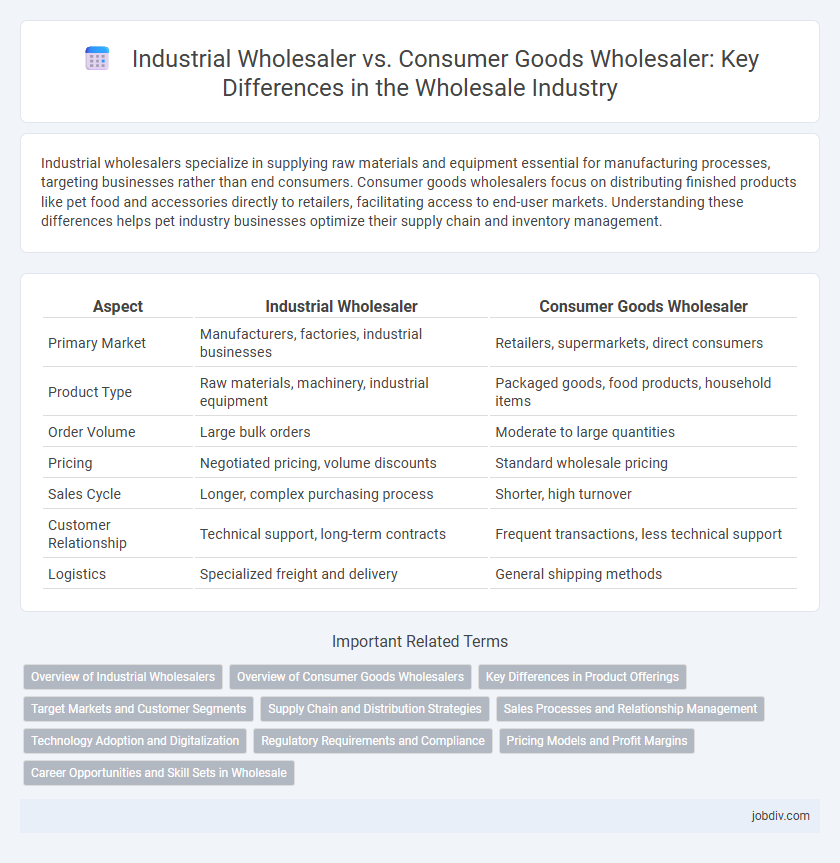Industrial wholesalers specialize in supplying raw materials and equipment essential for manufacturing processes, targeting businesses rather than end consumers. Consumer goods wholesalers focus on distributing finished products like pet food and accessories directly to retailers, facilitating access to end-user markets. Understanding these differences helps pet industry businesses optimize their supply chain and inventory management.
Table of Comparison
| Aspect | Industrial Wholesaler | Consumer Goods Wholesaler |
|---|---|---|
| Primary Market | Manufacturers, factories, industrial businesses | Retailers, supermarkets, direct consumers |
| Product Type | Raw materials, machinery, industrial equipment | Packaged goods, food products, household items |
| Order Volume | Large bulk orders | Moderate to large quantities |
| Pricing | Negotiated pricing, volume discounts | Standard wholesale pricing |
| Sales Cycle | Longer, complex purchasing process | Shorter, high turnover |
| Customer Relationship | Technical support, long-term contracts | Frequent transactions, less technical support |
| Logistics | Specialized freight and delivery | General shipping methods |
Overview of Industrial Wholesalers
Industrial wholesalers specialize in distributing raw materials, machinery, and equipment to manufacturing and production businesses, enabling efficient supply chain operations. They typically deal in bulk orders, customized products, and technical goods that support industrial processes, contrasting with consumer goods wholesalers who focus on finished products for retail markets. Their expertise in product specifications, logistics, and B2B relationships makes them essential partners in industrial supply chains.
Overview of Consumer Goods Wholesalers
Consumer goods wholesalers specialize in distributing finished products such as food, beverages, clothing, and household items directly to retailers or other businesses, ensuring a smooth supply chain from manufacturers to end consumers. Their operations focus on high-volume turnover, broad product assortments, and maintaining extensive distribution networks to meet diverse market demands. These wholesalers play a crucial role in enabling retailers to stock consumer-ready goods efficiently, contrasting with industrial wholesalers who primarily supply raw materials and equipment for manufacturing processes.
Key Differences in Product Offerings
Industrial wholesalers primarily supply raw materials, machinery, and equipment essential for manufacturing processes, catering to businesses' operational needs. Consumer goods wholesalers focus on finished products such as clothing, electronics, and household items intended for direct resale to retailers or end consumers. The product offerings differ significantly in complexity and purpose, with industrial wholesalers providing specialized goods for production, while consumer goods wholesalers distribute mass-market products.
Target Markets and Customer Segments
Industrial wholesalers primarily target manufacturing firms, construction companies, and industrial service providers, supplying bulk raw materials, machinery, and equipment essential for production processes. Consumer goods wholesalers focus on retailers, supermarkets, and smaller distribution outlets, offering finished products such as food, clothing, and household items designed for end consumers. The distinction in target markets and customer segments reflects the industrial wholesaler's emphasis on B2B relationships, whereas consumer goods wholesalers cater predominantly to B2C channels through retail intermediaries.
Supply Chain and Distribution Strategies
Industrial wholesalers specialize in supplying raw materials and machinery to manufacturers, optimizing supply chains through bulk purchasing and direct factory distribution. Consumer goods wholesalers focus on fast-moving products, leveraging extensive retail networks and demand forecasting to ensure timely delivery and inventory turnover. Effective distribution strategies in industrial wholesaling emphasize just-in-time delivery, while consumer goods wholesalers prioritize widespread coverage and rapid replenishment.
Sales Processes and Relationship Management
Industrial wholesalers prioritize long-term partnerships and customized sales processes to meet complex client specifications in manufacturing and production sectors. Consumer goods wholesalers focus on high-volume, fast-paced transactions emphasizing efficient order fulfillment and broad distribution networks to retail outlets. Relationship management in industrial wholesaling relies heavily on technical support and after-sales service, whereas consumer goods wholesalers emphasize brand alignment and promotional collaboration.
Technology Adoption and Digitalization
Industrial wholesalers leverage advanced technologies such as IoT-enabled inventory management and AI-driven supply chain analytics to optimize bulk distribution and reduce operational costs. Consumer goods wholesalers prioritize seamless e-commerce platforms and AI-based customer personalization tools to enhance user experience and accelerate order fulfillment. Both sectors invest heavily in digitalization, but industrial wholesalers emphasize integration with manufacturing systems, whereas consumer goods wholesalers focus on omnichannel retail connectivity.
Regulatory Requirements and Compliance
Industrial wholesalers face stringent regulatory requirements related to safety standards, hazardous material handling, and environmental compliance due to the nature of their products, which often include raw materials and machinery. Consumer goods wholesalers must comply with regulations focused on product safety, labeling, packaging, and consumer protection laws, ensuring products meet specific quality and health standards. Both types of wholesalers require robust compliance management systems, but industrial wholesalers typically navigate more complex regulatory frameworks involving OSHA, EPA, and industry-specific guidelines.
Pricing Models and Profit Margins
Industrial wholesalers often implement cost-plus pricing models, factoring in bulk purchase discounts and long-term contract negotiations to maintain steady profit margins. Consumer goods wholesalers typically adopt competitive pricing strategies, leveraging market demand fluctuations and brand recognition to optimize turnover and maximize slim profit margins. The contrasting approaches reflect the industrial sector's emphasis on relationship-driven sales and the consumer goods sector's focus on volume and market responsiveness.
Career Opportunities and Skill Sets in Wholesale
Industrial wholesalers specialize in supplying machinery, raw materials, and equipment to manufacturing and production companies, requiring strong technical knowledge, negotiation skills, and expertise in supply chain management. Consumer goods wholesalers focus on products like food, clothing, and household items, demanding skills in market analysis, customer relationship management, and inventory control. Career opportunities in industrial wholesaling often include roles such as procurement manager and logistics coordinator, while consumer goods wholesaling offers positions like sales representative and marketing analyst, both emphasizing strategic planning and sales proficiency.
Industrial Wholesaler vs Consumer Goods Wholesaler Infographic

 jobdiv.com
jobdiv.com